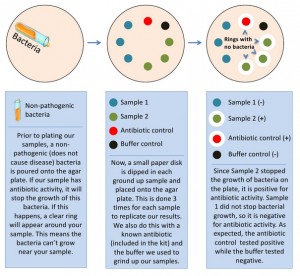I wrote yesterday about the rising use of games for delivering social good, be that via increased awareness or via improving scientific understanding. Such games have gained a lot of the attention in the past year, but the field of citizen science has a long back story.
A new project launched by two University of Chicago researchers is looking to recruit citizens to help address the threat caused by antibiotic resistance.
The project, called the International Laboratory for the Identification of New Drugs (ILIAD), was instigated after a report was released by the Center for Disease Control showing that two million Americans are infected each year with bacteria that is resistant to antibiotics, with these infections killing around 23,000 people per year. That report brought the threat to the public attention, and prompted the two researchers to explore ways they could help.
The area they selected was in the development of antibiotics themselves. They found that since 2010 just one new antibiotic had been approved, despite substantial investment in researching and developing them. Whilst citizens may not be able to develop new antibiotics themselves, they nevertheless believed there were ways they could join the effort.
The process began with a crowdfunding campaign launched last week on Indiegogo. The campaign asked people to financially support the project in return for a kit that helps the researchers test for new antibiotics.
The involvement required from people sounds very straightforward. They receive their kit in the post, and can then use the kit to test various crushed samples for potential antibacterial properties. These samples could be as simple as leaves or flowers from the local neighbourhood. Their findings are then posted onto the ILIAD website. With penicillin having derived from fungi, the researchers hope that this approach may derive some interesting results.
With a campaign goal of raising $42,000 there is still some way to go, with the next three weeks requiring over $35,000 of the total still required. If you’d like to get involved, you can do so here.
